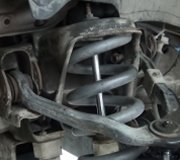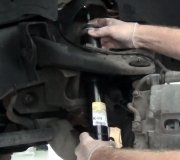First you have to describe what the noise sounds like. Is it a clunk? A rattle? Buzzing or humming noise? Tie rod ends do not cause a noise unless they were ignored for so long that they make an intermittent clunking noise. You will notice the direction of steering changes when you are on verses off the gas when a tie rod end is badly worn.
Wheel bearings cause a humming noise like an airplane engine. With Chrysler's older bearings from the 1980's, you could figure out which one was noisy by turning slightly, as in when changing lanes. With the newer bolt-on style you have, it is impossible to tell by only driving the van. The noise can originate on one side but transfer to the other side where it sounds like it is coming from. The best way to identify the noisy bearing is to run the engine, in gear, on a hoist, and listen next to them with a stethoscope. You can also raise a front tire off the ground, reach over the top of the tire and wrap your fingertips lightly around part of the coil spring, then spin the tire slowly by hand. If the wheel bearing is noisy, you will feel the vibration in the spring. Looseness or play in a wheel bearing is not a valid clue. The noisiest of bearing will not have any play in them. In more than thirty five years as a suspension and alignment specialist, I have only seen one wheel bearing that had play in it, and that one was ignored by the owner for over three years, and he did not believe multiple people telling him the wheel should not be able to move three inches in and out on top!
Bearings in the transmission rarely cause noise or other problems. They rotate too slowly. The best way to listen to them is to use a tool called a "Chassis Ear". That is a set of six microphones, a switch box, and head phones. You clip the microphones to suspect parts, then listen while driving.
The half shafts also rotate too slowly to make noise. When an outer CV joint becomes worn excessively, the marbles inside it will bind in the carefully-machined channels they ride in and cause a clicking sound at real low speeds, mainly when turning sharply and backing up. You will not hear them at speeds higher than you would drive in a parking lot.
Tuesday, June 5th, 2018 AT 11:00 PM


